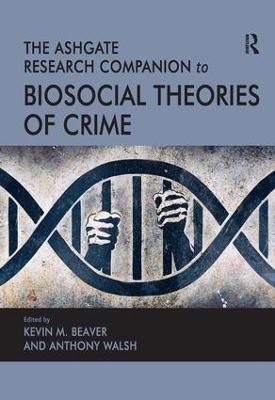
The Ashgate Research Companion to Biosocial Theories of Crime
Routledge (Verlag)
978-1-4094-0843-7 (ISBN)
In response to exciting developments in genetics, neuroscience and evolutionary psychology, a number of criminologists have embraced the position that criminal behaviour is the product of biological, psychological, and sociological factors operating together in complex ways. They have come to realize that if they are to capture the dynamic nature of criminal behaviour then they must span multiple levels of analysis and thus multiple disciplines. The explosion of interest in this field of biosocial criminology over the past ten years means that the time is ripe for this research companion aimed at graduate students and scholars, giving them an essential overview of the current state of research in the field. The authors are experts in a variety of disciplines (sociology, psychology, biology, criminal justice, and neuroscience), but they all have in common a strong interest in criminal behaviour. This unique book is essential and accessible reading for all students and scholars in the field.
Kevin M. Beaver is Associate Professor, College of Criminology and Criminal Justice, Florida State University, USA and Anthony Walsh is Professor of Criminal Justice, Boise State University, USA
Contents: Part I Introduction and Overview of Biosocial Criminology: Biosocial criminology, Kevin M. Beaver and Anthony Walsh; Biosocial interactions and correlates of crime, Anna Rudo-Hutt, Yu Gao, Andrea Glenn, Melissa Peskin, Yaling Yang and Adrian Raine; The relationship between low resting heart rate and antisocial behavior: correlation or causation?, Todd A. Armstrong. Part II Genetics and Crime: The genetics of criminality and delinquency, Lisabeth Fisher DiLalla and Sufna Gheyara; Molecular genetics and crime, John Paul Wright, Kristan Moore and Jamie Newsome; Gene x environment interactions in antisocial behavior, Christopher J. Ferguson. Part III The Brain and Crime: Neurotransmitters: indirect molecular invitations to aggression, Raymond E. Collins; The limbic system and crime, Matt DeLisi; Neurobiological perspectives of brain vulnerability in pathways to violence over the life course, Denise Paquette Boots; The neuroscientific basis of situational action theory, Kyle Treiber. Part IV Environments and Crime: The independence of criminological 'predictor' variables: a good deal of concerns and some answers from behavioral genetic research, H. Harrington Cleveland, Charles Beekman and Yao Zheng; Birth complications and the development of criminality: a biosocial perspective, Stephen G. Tibbetts; Presaging problem behavior: the mutability of child temperament, parenting, and family environments from gestation to age 3, Matt DeLisi and Michael G, Vaughn; Social class and criminal behavior through a biosocial lens, Anthony Walsh and David G. Mueller. Part V Evolutionary Psychology and Crime: Women's avoidance of rape: an evolutionary psychological perspective, William F. McKibbin and Todd K. Shackelford; The search for human rape and anti-rape adaptations: 10 years after A Natural History of Rape, Ryan M. Ellsworth and Craig T. Palmer; The nature and utility of low self-control, Richard P. Wiebe. Part VI Implications of Biosocial Research: Biosocial treatment and prevention strategies, Michael G. Vaughn and Ralph Groom; From petri dish to public policy: a discussion of the implications of biosocial research in the criminal justice arena, Joseph Rukus and Chris L. Gibson; Index.
| Erscheint lt. Verlag | 8.11.2011 |
|---|---|
| Verlagsort | London |
| Sprache | englisch |
| Maße | 174 x 246 mm |
| Gewicht | 1020 g |
| Themenwelt | Recht / Steuern ► Strafrecht ► Kriminologie |
| ISBN-10 | 1-4094-0843-4 / 1409408434 |
| ISBN-13 | 978-1-4094-0843-7 / 9781409408437 |
| Zustand | Neuware |
| Haben Sie eine Frage zum Produkt? |
aus dem Bereich


